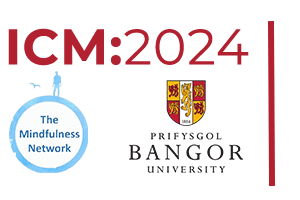ICM:2024 workshops, retreat, and training
conference workshops
Delve deeper into mindfulness with in-person workshops before and after the conference, set for Friday, August 2, and Tuesday, August 6, in Bangor. These workshops focus on specific aspects of mindfulness, adding depth to your overall conference experience. Each session offers a unique opportunity to gain valuable insights from experienced facilitators. With multiple workshops occurring simultaneously, you can tailor your time at ICM:2024, selecting the topics that resonate most with you. Access to workshops is included in the conference pass —buy yours now.
pre-conference workshop
Knowing how it feels: A deep Exploration of Vedanas (Feeling Tones) with Martine Batchelor
During this half-day workshop, I would like to explore mindfulness of feeling tones, which is the second foundation of the practice of mindfulness. The Pali term 'vedana' refers to the affective tone of experience. When we come into contact through one of our six senses with the environment, we experience a pleasant, unpleasant or neither pleasant nor unpleasant feeling tone. It is important to see that feeling tones are constructed, they are not a given, they do not reside in the object we come in contact with. It is vital to be aware of feeling tones as they arise extremely fast and have a profound impact on our behaviour. There is an ancient text which describes 108 types of feeling tones. There is also another text which mentions our underlying tendencies in connection to feeling tones. During our time together we will look at the practical application of being mindful of the different types of feeling tones and we will also look at our underlying tendencies.
pre-conference workshop
Good Grief: There is a Reason to be Here with William Fley
As Rumi beautifully said: “Your task is not to seek for love, but to seek and find all the barriers within yourself that you have built against it.”
Welcome to one of the opening pre-conference workshops at the ICM conference at Bangor.
In the last few years we have seen and witnessed many other aspects of loss, resulting from war, climate change, recession and COVID. Over time this can challenge our internal resources and resilience and impact our mental health. We might feel less connected, or that we have not been heard or witnessed or that the changing nature of the world is too much for us to deal with. During this opening workshop we invite you to pause and reflect as we gather during this weekend with great minds and hearts in the mindfulness world. This workshop is an offering as a remembrance of the suffering around the world and also those we have lost and we loss. Through ritual, guided practice, discussions and the stages of grief we will unite in loving gratitude and remembrance.
When grief is a collective and shared path it becomes more manageable. We realise as practitioners the importance and sacredness of grief, without fearing it or judging our healing pathway; and while grief is personal and happens in its own time and in its own way, every journey is different. Sometimes we simply don’t have the space to grieve, and we can find ourselves suffering years later but not recognise it as unresolved grief.
There are many situations that cause us serious pain and sorrow: life changing losses; the death of a loved one; a relationship ends; a pet dies, a job ends; divorce. Then there is everyday grief: a friend lets us down; our children struggle; we feel the loss of our roots and community. Our culture seems to encourage the ‘stiff upper lip’ and ‘moving on’. But it doesn’t have to be this way. There is no timeline for, or solution to ‘getting over’ or ‘moving on’ from grief. But we can learn to grow around our painful wounds and begin to come to a place of peace and remember with more love than pain. Grief isn’t something you simply “fix”; instead, it’s a process that you learn to navigate with time, patience, and self-compassion. Develop the skills and mindset needed to effectively cope with the inevitable ups and downs of grief, allowing you to find healing, growth and, ultimately, a renewed sense of purpose and meaning in your life.
Enquiry questions:
1. How do we work with our attachment and aversion to power to deepen our collective and nuanced understanding of grief as a tool of liberation?
2. How can we call forth embodied spiritual teachings within our lineages to help guide us in wielding personal and collective power with precision in the face of loss and in service of global change?
3. How do we best integrate after love and loss while simultaneously attuning to the need for protection of ourselves–and ultimately all others–on this path?
Join us for this beautiful opening ceremony and shared exploration and please bring some flowers or an object to build a communal shrine,
pre-conference workshop
The MBI:TAC: Past, Present and Future - Holding Integrity in a Changing Landscape with Lynn Koerbel, Dr Gemma Griffith, Jem Shackleford, Colleen Camenisch, and Dr Sophie Sansom.
The evolving global landscape necessitates a proactive response from the mindfulness teaching community, prompting a natural shift in how mindfulness is disseminated. The Mindfulness-based Interventions-Teaching Assessment Criteria (MBI:TAC) serves as a framework delineating the attributes of skilful mindfulness teaching. We posit that this framework has the potential to maintain the thread of integrity and quality amidst ongoing innovation and adaptation. In this workshop, our primary objective is to foster a dialogue of mutual learning. We will present the MBI:TAC, providing an overview of its development and historical uses of the tool. We aim to collaboratively explore elements that prove effective and enduring even within the context of our dynamically changing world. Furthermore, we will showcase existing adaptations of the MBI:TAC tailored for specific contexts, populations, and curricula. Our collective endeavour will involve brainstorming to glean insights into potential future applications of the tool. This interactive session seeks to not only acknowledge the shifts in mindfulness teaching but also to contribute to the ongoing discourse on maintaining efficacy, integrity and relevance in an evolving landscape.
This workshop might appeal to mindfulness teachers, therapists using ACT, DBT, EMDR and other therapies that have mindfulness as a component, coaches, MBP trainers and anyone interested in the ways we might support integrity in mindfulness teaching while enabling innovation in pedagogy and delivery styles.
post-conference workshop
MBSR for our current times: The relevance and power of MBPs when rooted in lived experience facilitated by Dean Francis and Nana Korantema Pierce Williams with Aesha Francis, Bridgette O'Neill, Rebecca Crane, Michael Waupouse, Noriko Morita Harth and Zayda Vallejo.
“We’re all created equal in this cellular system, but we’re not all treated equally in the world. And it’s important for us to look at what we’ve been a part of co-creating. What we see happening in the world right now are karmic blooms. They’re the result of past actions manifesting. The hatred we see, the harm, the ignorance, the discontent, it’s all the result of past actions, which really is inviting us to look at the actions we take now that will support a biosphere of well- being, because what [is left] unfinished is reborn.”
Ruth King in Tricycle ‘Teachings for Uncertain Times’ February 17, 2017.
This day long workshop is led by the diverse team who co-wrote the paper, “Mindfulness based stress reduction for our time: a curriculum that is up to the task”. It will explore the concept, implications, and possibilities of socially engaged mindfulness practices. Socially engaged practice aims to make mindfulness more widely accessible, relatable, and socially engaging, and to highlight social and ecological causes of suffering and the role mindfulness can have in addressing these.
Contemporary mainstream mindfulness has been critiqued for its focus on individual outcomes to the neglect of wider systemic forces that shape our experience and sense of ourselves, including belief systems underpinning discrimination, and prejudice, and the recognition that our wellbeing is completely contingent on collective wellbeing. An over emphasis on common humanity and universality can lead us to avoid engaging with difference in all its richness and challenge. We can’t address causes of suffering or feel a sense of belonging without curiosity, validation, and recognition of each of our individual uniqueness.
This workshop will invite each of us to consider ‘this being human’ alongside being this human being. We will shine a light on how it is to be a human being in this particular moment in history. We will explore how these dual considerations might inform next steps for us as individuals and collectives to support us to integrate a social lens in our mindfulness practice, teaching, and research. What might be needed for our mindfulness practice, teaching and research to become more inclusive, contextualised, and relatable so that it both benefits individuals and wider society?
We will explore the relevance and power of MBSR when it is rooted in lived experience and tinged with the humility, vulnerability, and fortitude required to take a closer look at what it is to be an evolving socially aware human and lifelong learner.
The day will be held in a community of practice framework designed to facilitate each of us in bringing a kind, courageous beginners’ mind to exploring together how MBSR has emerged, where it has been, and where it can go amidst our collective global concerns.
To this end, this workshop will be about encouraging a collective exploration of the perceived moral and ethical boundaries of the individual, secular, social and spiritual practice of mindfulness, through an explicitly inclusive social lens that is rooted in justice, equity, diversity and inclusion or what we like to call JEDI work.
post-conference workshop
Responding to the Climate Crisis - with Jamie Bristow and Dr Sophie Sansom
This full-day post conference workshop aims to explore the many ways that mindfulness can support wise and compassionate responses to the climate crisis, increasing resilience, fostering pro-environmental attitudes and behaviours, connecting to nature, and facilitating values-driven action. In this workshop, we will hear about the latest evidence and teaching innovations in the area, have an opportunity to try climate-related mindfulness practices, and connect around topics of special interest, such as research, teaching, personal applications, and public policy. Throughout the day, attendees will engage in interactive sessions designed to enable shared inquiry and collaboration, whilst deepening participants understanding of mindfulness practices and their application to the defining societal issue of our time. The workshop will cover a range of topics including:
- Removing barriers to action: delve into the potential for mindfulness to combat common psychological defence mechanisms and biases and help overcome the ‘values action’ gap that limits individual and collective action.
- Mindfulness and Nature Connection: understand how mindfulness can support our depth of connection and identification with the natural world, and awareness of the impacts of human activity on the environment. ·
- Resilience in the Face of Threat and Disruption: discuss and sample how mindfulness can help with eco-anxiety and foster individual and collective emotional resilience amidst the growing impacts of climate change.
- Sustainable and Regenerative Living through Mindful Practices: consider practical strategies for integrating mindfulness into daily life to reduce ecological footprints whilst developing our pro-active engagement or ‘handprint’.
The workshop will feature a blend of guided mindfulness exercises, group discussions, presentations and practical activities. Participants will have the opportunity to reflect on their personal relationship with the environment, share experiences, and develop actionable plans to collaborate with others working in the field or incorporate mindfulness into their personal efforts to address the climate crisis.
This workshop is designed for academics, environmental activists, mental health professionals, and anyone interested in integrating mindfulness into their approach to addressing the climate crisis. No prior experience with mindfulness practices is necessary.
post-conference workshop
Mindfulness for Future Generations with Emily Slater, Esther Ghey, Katherine Weare, Sarah Silverton, Ben Chalwin, Faiy Rushton, Richard Burnett, and Jason Steele
Mindfulness is now found in many areas of today's society, but what potential does it hold for future generations? Do join us to consider the potentials and challenges of mindfulness for future generations. We will also explore ways in which educational / youth-related settings, and the individuals within them, can be supported on their journey to introducing well-designed and sustainable mindfulness-based initiatives; what the research, experience and feedback tells us about the best ways to do this successfully; and, how educators, campaigners, parents and others might be able to encourage interest and support for mindfulness for the benefit of future generations ensuring equal access to mindfulness approaches for all at a time when it is needed most.
Drawing on its rich experience (since 2009), as well as that of others in the field, this workshop will be facilitated by Mindfulness in Schools Project (MiSP). Our hope is to open up a dialogue of mutual inquiry, hearing and learning from one another, collectively exploring what mindfulness might look like in future generations. It will include an opportunity to hear the latest research overview from Professor Katherine Weare; insights from children and young people themselves; an overview of lessons learnt in the development of school based mindfulness, introducing a framework that offers diverse entry points and a range of paths to introducing and sustaining mindfulness within and for educational communities, including: a mindful approach to any role in a school; mindful subject teaching; discrete teaching of mindfulness to students; supporting school mindfulness teacher communities, and intentionally developing a whole school culture that embodies the values, qualities and attitudes of mindfulness.
This workshop will also hear reflections on the recent inspirational work by Esther Ghey (mother of murdered British teenager, Brianna) to fund the mindfulness training of a teacher in every school in Brianna’s home town of Warrington, as well as raise awareness of mindfulness with media and decision makers. We are delighted that Esther will be able to join to share her perspectives as a parent, mindfulness practitioner and Director of new CIC, Peace and Mind UK, and that Emily Slater (CEO of MiSP) will join her for this.
Known for its age specific curricula, this workshop will be sure to also include a taster of MiSP’s newest curriculum, tailored at our youngest learners, 3-6 year olds, as well as from The Present’s curriculum for schools, with an opportunity to hear directly from The Present Director and curriculum author, Sarah Silverton, as part of sharing a new official collaboration between the two organisations.
This is a workshop open to all, and will be an opportunity also for educators and anyone caring for children and young people in a professional or personal capacity or passionate for other reasons to join together and network. If you care deeply about future generations and ensuring as many people as possible access mindfulness in their lives? We hope this workshop will offer you practical tools and inspiration.
conference retreat day
Following the main conference, you can join a very special mindfulness retreat day guided by Rhonda Magee and Catherine McGee.
This dedicated day of practice provides a space for integration and reflection on the personal insights you have gained during ICM:2024. We know conferences can be intense, filled with information and experiences. This retreat day offers a calm environment to extend the conference, enabling you to step back, absorb the learning, and ground yourself before re-entering everyday life. Taking the time to pause can support you in embodying the changes you want to bring back to the world.
The retreat day will take place on Monday 5 August in Bangor University's majestic Neuadd Prichard Jones (PJ Hall) within the Main Arts Building - a short distance from Pontio.

The day will be held within the container of silence. Lunch is provided between 12:30 - 13:30.
There will be a small amount of meditation equipment at the venue so you are advised and welcome to bring your own equipment to support you in your formal practice (such as cushion, stool, yoga mat, blanket).
Access to the retreat day is included in the 5-day conference pass—secure yours now.



